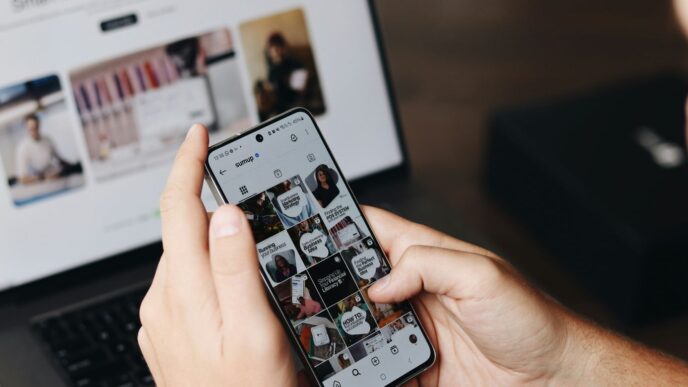Alright, so you’ve landed a phone screen. That’s awesome! These quick chats are usually the first step to getting a real interview. Think of it like a quick check to see if you’re a good fit for the job and if your skills line up with what they need. It might seem casual, but don’t let that fool you. Getting ready for these phone screen interview questions is super important. This guide will walk you through the usual questions, give you some ideas on how to answer them well, and show you how to make a good impression.
Key Takeaways
- Know the typical phone screen interview questions: Be ready for questions about your past jobs, your skills, and why you want this specific job.
- Give clear and short answers: Make sure your answers are to the point and show off what you can do.
- Show you’re excited and a good fit: Show them you really want the job and that you’d be a good addition to their team.
- Ask smart questions: Have a few questions ready for them about the job, the company, and what happens next.
- Avoid common mistakes: Don’t forget to prepare, speak clearly, and check your tech before the call.
Understanding the Phone Screen Interview Process
Overview of the Phone Screen Process
Okay, so what’s the deal with phone screen interviews? Think of it as the first gate you have to pass. It’s a quick way for companies to see if you’re worth bringing in for a real interview. The main goal is to check if your skills and experience match what they’re looking for. Recruiters use this time to get a feel for your personality and communication style, too. It’s basically a first impression, so make it count! The phone screen interview is a crucial step.
Who Conducts the Phone Screen?
Usually, it’s someone from HR or a recruiter who’ll be on the other end of the line. But sometimes, you might even talk to the hiring manager or someone else on the team. It really depends on the company. Knowing who you’re talking to can help you tailor your answers. If it’s HR, they’re probably looking for a general fit. If it’s the hiring manager, they might dig deeper into your technical skills.
Setting the Stage for Success
Alright, let’s talk prep. You wouldn’t go on a first date without brushing your teeth, right? Same goes for a phone screen. Make sure you’re in a quiet place where you won’t be interrupted. Have your resume handy, along with a pen and paper for notes. And for goodness’ sake, charge your phone! Here’s a quick checklist:
- Find a quiet spot.
- Have your resume ready.
- Charge your phone (or use a landline!).
- Have questions prepared to ask the interviewer.
Trust me, a little preparation goes a long way.
Common Phone Screen Interview Questions and Effective Answers
Phone screen interviews are a big part of the hiring thing. If you get ready, know what to expect, and don’t make silly mistakes, you can make a good impression and up your chances of getting the job. Remember, getting ready is key. To learn more about interview prep, check out guides on STAR interview questions.
Basic Phone Screen Interview Questions
Okay, so they’re gonna ask some basic stuff. Here’s the lowdown:
- "Tell me about yourself." This is usually the opener. Don’t go into your life story. Stick to your work history, focusing on the stuff that matches the job description. Keep it snappy.
- "Why are you interested in this role?" This is where you show you’ve done your homework. Mention specific things about the job and the company that appeal to you. Show some real excitement, not just "I need a job."
- "What are your salary expectations?" Do your research beforehand. Know the average salary for the position in your location. Give a range, not a hard number, and say you’re open to discussion.
Experience-Related Phone Screen Interview Questions
They’ll want to know about your past. Here’s how to handle it:
- "Describe your previous work experience." Sum up your experience, highlighting the roles and duties that fit the job you’re after. Use this as a chance to talk about successes that show you’re a good candidate.
- "How does your background match what this job needs?" Connect your past jobs to the one you want. Point out skills or experiences that relate to the main tasks of the job. Make it clear you’re not just guessing.
- "Tell me about a time you failed." Everyone messes up sometimes. Talk about a time you screwed up, but more importantly, what you learned from it and how you changed your approach afterward.
Phone Screen Interview Questions About Skills
Skills are key. Here’s how to talk about yours:
- "What are your main skills?" Focus on skills that are not just useful but key for the role. If it’s a tech job, mention coding languages, problem-solving, or experience with specific tools.
- "How have you applied these skills in your previous jobs?" Give examples of how your skills helped you succeed. Talk about results, like making processes smoother, boosting productivity, or leading a successful project.
- "What are your strengths and weaknesses?" For strengths, pick a few that are relevant to the job. For weaknesses, choose something real but not a deal-breaker, and explain how you’re working to improve it.
Strategic Preparation for Phone Screen Interview Questions
Phone screen interviews can feel like a breeze, but don’t be fooled! A little prep work can seriously boost your chances of moving on to the next round. It’s not just about knowing your resume inside and out; it’s about showing the interviewer you’re genuinely interested and ready to bring something to the table. Let’s break down how to get yourself strategically prepped.
Research the Company Thoroughly
Seriously, don’t skip this step. Knowing about the company is more than just reciting their mission statement. Dig into their recent projects, news, and even their social media presence. Understanding their culture and values will help you tailor your answers and show you’re not just looking for any job, but this job. If you don’t look into the company or job, recruiters might see it as a big warning sign. Being prepared shows you’re keen on the chance and value the interviewer’s time. For example, if they’ve recently launched a new product, mention it! It shows you’re paying attention. This comprehensive research allows job seekers to stand out during the phone screening.
Practice Your Responses Aloud
It sounds simple, but actually saying your answers out loud makes a huge difference. You’ll catch awkward phrasing, stumbles, and areas where you need more clarity. Don’t just think about what you want to say; say it. Record yourself if you can. It might feel weird, but it’s a great way to identify areas for improvement. Focus on common questions like "Tell me about yourself" or "Why are you interested in this role?" Practicing common phone interview questions allows job seekers to confidently and effectively communicate their qualifications and fit for the role.
Prepare Your Environment
Find a quiet place where you won’t be interrupted. Turn off the TV, silence your phone, and let your family or roommates know you need some peace and quiet. A professional setting, even if it’s just a corner of your bedroom, can help you stay focused and project confidence. Make sure you have a glass of water nearby, and keep a copy of your resume and the job description in front of you. Along with a quiet space, having the necessary tools and equipment can enhance a phone screening experience. These include:
- A headset or headphones
- A microphone
- A stable phone connection
Key Strategies for Answering Phone Screen Interview Questions
Crafting Concise and Clear Answers
Okay, so you’re on the phone, and they ask you a question. Don’t ramble! Get straight to the point. Recruiters are busy people, and they’re trying to quickly assess if you’re a good fit. Think of it like this: less is more. A well-structured, concise answer shows you can think clearly and communicate effectively. It’s way better than a long, winding story that loses the interviewer’s attention. Make sure you understand the question before answering. If you need a moment to gather your thoughts, it’s perfectly acceptable to say, "That’s a great question, let me think about that for a second."
Highlighting Relevant Skills and Experiences
This is your chance to shine! Don’t just list your skills; show them off. When answering questions, always tie your skills and experiences back to the job description. For example, if the job requires project management skills, don’t just say you have them. Instead, describe a specific project where you successfully used those skills. Use the STAR method (Situation, Task, Action, Result) to structure your answers. This helps you provide a clear and compelling narrative. Think about the key requirements of the role and prepare examples that demonstrate how you meet those requirements. This targeted approach will make a much stronger impression than a generic overview of your qualifications. Make sure to mention your interview skills to get a job.
Demonstrating Enthusiasm and Fit
Enthusiasm is contagious! Even over the phone, your excitement for the role and the company can make a big difference. Let your personality shine through. Do your research on the company beforehand, and mention specific things that excite you about their mission, values, or recent projects. Show that you’re not just looking for any job, but that you’re genuinely interested in this particular opportunity. A little bit of passion can go a long way in setting you apart from other candidates. Remember to smile (even though they can’t see you, it comes through in your voice!), and use positive language. Show that you’re not only qualified but also a great fit for the company culture.
Asking Insightful Questions During Your Phone Screen
It’s not just about answering questions; it’s also about asking them. This shows you’re engaged and genuinely interested in the role and the company. Asking smart questions can really set you apart from other candidates. Don’t just ask anything, though. Think about what you really want to know and what will help you decide if this job is a good fit for you.
Inquiring About Daily Responsibilities
Instead of just asking "What will I be doing?", try to get a more detailed picture. A good question is something like, "Could you walk me through a typical day or week in this role?" This helps you understand the actual tasks and challenges you’ll face. It’s way more useful than a generic job description. Understanding the daily responsibilities is key to knowing if you’ll actually enjoy the work.
Understanding Company Culture
Company culture can make or break a job. You don’t want to end up in a place where you don’t fit in. Ask questions that give you insight into the company’s values and work environment. For example, "How would you describe the company culture here?" or "What are some things that employees value most about working here?" These questions can reveal a lot about the company culture and help you decide if it’s a place where you’ll thrive.
Clarifying Next Steps in the Hiring Process
Always ask about the next steps. It shows you’re proactive and eager to move forward. A simple question like, "What are the next steps in the hiring process, and what’s the timeline?" is perfect. This not only gives you a clear idea of what to expect but also demonstrates your continued interest in the position. Knowing the next steps helps you stay on top of things and prepare accordingly.
Avoiding Common Pitfalls in Phone Screen Interviews
Phone screen interviews can be tricky. It’s easy to stumble, even if you’re a great candidate. Knowing what to avoid can seriously boost your chances of moving forward. Let’s look at some common mistakes and how to dodge them.
Lack of Preparation
Walking into a phone screen without doing your homework is a big no-no. Recruiters can tell if you haven’t bothered to learn about the company or the role. It shows a lack of interest and respect for their time. Before the call, spend some time on the company’s website, check out their social media, and read the job description carefully. Understand their mission, values, and recent news. This way, you can tailor your answers to show how you fit in. Not doing so is a recipe for disaster. You should also prepare answers to common questions. For example, you should be ready to talk about your previous work experience.
Poor Communication Habits
How you communicate matters just as much as what you say. Avoid rambling, using filler words like "um" or "like," and interrupting the interviewer. Speak clearly and concisely, and listen attentively to their questions. If you’re not sure you understood something, don’t be afraid to ask for clarification. Good communication also means being mindful of your tone. Even though they can’t see you, your enthusiasm (or lack thereof) will come through in your voice. Here’s a quick guide:
- Speak Clearly: Enunciate your words and avoid mumbling.
- Be Concise: Get to the point without rambling.
- Listen Actively: Pay attention and respond thoughtfully.
Addressing Technical Issues Proactively
Technical difficulties can derail a phone screen faster than you can say "can you hear me now?" Before the interview, make sure your phone is fully charged, you have a strong signal, and you’re in a quiet environment. Test your microphone and speakers to ensure they’re working properly. Have a backup plan in case something goes wrong, like a landline or a different location. Let the interviewer know immediately if you’re experiencing any technical issues. Don’t just hope they’ll go away. Being proactive shows that you’re responsible and can handle unexpected challenges. Here’s a checklist to help you avoid technical problems:
- Check your battery level.
- Ensure a stable connection.
- Find a quiet place.
Post-Interview Actions for Phone Screen Success
Sending a Timely Thank You Email
Okay, so you’ve just finished the phone screen. Don’t just sit back and wait! Sending a thank-you email is super important. Aim to send it within 24 hours. It doesn’t have to be super long, but it should definitely thank the interviewer for their time, reiterate your interest in the position, and maybe mention something specific you discussed to show you were paying attention. It’s a small thing that can really make you stand out. Think of it as a quick way to show your enthusiasm and interest.
Following Up on Next Steps
Following up is a delicate art. You don’t want to be a pest, but you also don’t want to be forgotten. In your thank-you email, it’s perfectly acceptable to politely ask about the timeline for the next steps. For example:
- "I’m eager to learn about the next steps in the interview process."
- "Could you provide a general timeframe for when I might expect to hear back?"
- "I look forward to hearing from you soon regarding the follow-up interviews."
If you haven’t heard back within the timeframe they gave you (or if they didn’t give you one, wait about a week), it’s okay to send a brief follow-up email. Just keep it professional and reiterate your interest. Don’t get discouraged if you don’t hear back immediately – hiring processes can take time!
Conclusion
So, that’s the scoop on phone screen interviews. They might seem like a small step, but they really matter. If you get ready, know what kinds of questions they’ll ask, and try not to mess up the easy stuff, you can totally make a good mark and get closer to landing that job. Just remember, practicing and being prepared are super important. It’s like anything else, the more you do it, the better you get.
Frequently Asked Questions
What is a phone screen interview?
A phone screen is like a quick chat with a company to see if you might be a good fit for a job. It’s usually the first step before a longer interview.
Who usually does the phone screen?
Usually, a recruiter or someone from the HR team will call you. Sometimes, it might be the person who would be your boss.
How should I answer questions?
Keep your answers short and to the point. Focus on what’s important for the job. Show that you’re excited and a good match for the company.
What should I do after the phone screen?
Always send a thank-you email soon after your call. It shows you’re thankful and still interested.
How can I avoid tech problems?
Make sure your phone is charged, and you’re in a quiet place. Check your internet if you’re using video. Being ready helps avoid problems.
Should I ask questions during the phone screen?
Yes! It shows you’re really interested and helps you learn more about the job and the company. Ask about daily tasks or what happens next.














